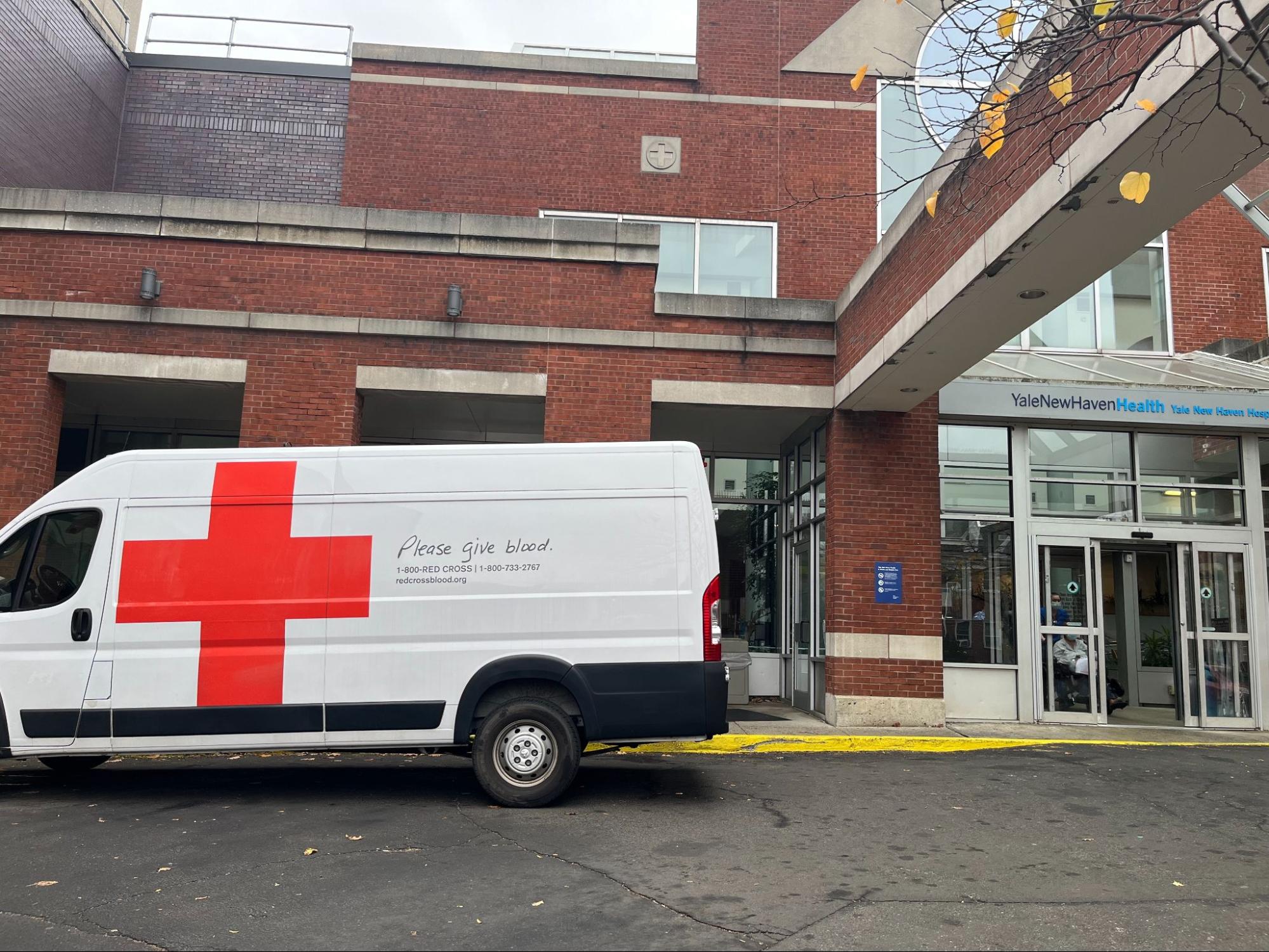Red Cross aims to diversify blood donor pool
On Friday, the Red Cross hosted a blood drive at Yale New Haven Hospital’s St. Raphael Campus. Ahead of the drive, organizers put out a call for more donations from Black individuals to increase the blood matches for patients with sickle cell disease.

Maggie Grether, Contributing Photographer
Collecting blood from racially diverse donor pools is crucial to ensuring that every patient who needs blood can find a match.
But only three percent of donors to the American Red Cross, one of the largest suppliers of blood nationally, are Black.
Blood donors skew overwhelmingly white, making up 88 percent of donors to the Red Cross, according to Red Cross Regional Communications Director Jocelyn Hillard. This racial disparity can lead to a dangerous undersupply of blood for patients with sickle cell disease.
Both nationally and locally, the Red Cross has begun efforts to diversify its pool of blood donors. On Nov. 11, the Red Cross held a blood drive in the cafeteria of the St. Raphael Campus of Yale New Haven Hospital.
In the days before the event, Dwight Central Management team sent out an email promoting the drive that mentioned that the Red Cross “is specifically working to collect blood donations from people of African descent.”
“There are people [with sickle cell disease] who may have multiple transfusions a year with upwards of one hundred [transfusions],” Hillard said. “So this is incredibly important that we have a strong and diversified blood supply available so that people who are experiencing sickle cell or another blood disease have that right match for them.”
Sickle cell disease is an inherited blood disorder that affects approximately 100,000 Americans, most of whom are Black or Hispanic. The disease causes the blood’s oxygen-carrying protein hemoglobin to become hard and crescent-shaped, clogging blood flow and causing medical problems including severe pain, infection and organ failure.
One in every 365 Black infants are born with sickle cell disease, according to the Centers for Disease Control and Prevention.
Blood transfusions, which decrease the concentration of crescent-shaped hemoglobin, are one of the most common treatments for sickle cell disease. Finding a correct blood match for patients with sickle cell disease is particularly critical, according to Dr. Christopher Tormey, professor of laboratory medicine at Yale and director of transfusion and apheresis services with the Yale New Haven Hospital.
Tormey said that if blood is not correctly matched, a sickle cell disease patient can form antibodies that act against antigens in the transfused blood. This can pose serious health threats and limit the type of blood a patient can receive in the future.
According to the Red Cross, one in three Black blood donors is a match for someone with sickle cell disease.
Having a diverse blood supply is “absolutely crucial” for treating patients with sickle cell disease, Tormey told the News. “We couldn’t make these transfusions as safe as possible, unless we have an absolutely diverse donor population.”
In New Haven, Hillard said that the Red Cross has focused on connecting with community groups, churches and schools to encourage blood donations and host drives in areas accessible to Black community members. In early 2021, the Red Cross partnered with Michelle’s House, a New Haven nonprofit dedicated to helping patients with sickle cell disease, to host a sickle cell awareness blood drive.
There are a variety of explanations for why rates of blood donations among Black individuals remain low. One National Institutes of Health study found that lower donor eligibility, increased donor deferral and lack of access and information about blood donations causes proportionally low rates of blood donations from Black individuals.
The study also pointed to mistrust of a healthcare system that has a history of exploiting Black communities through programs like the Tuskegee Syphilis Study.
In 1941, when the Red Cross began the National Blood Donor Service, it explicitly excluded Black donors. When it began accepting donations from Black individuals the following year, the organization segregated blood donations based on race.
The Red Cross did not fully integrate blood donations until the 1950s, and segregated blood policies persisted in Arkansas and Louisiana until the 1960s and 70s.
According to Tormey, the Yale New Haven Hospital has not had to deny blood to a patient with sickle cell disease over the past three years. However, the COVID-19 pandemic has caused chronic blood shortages.
“There is, to be totally frank, a constant threat to the blood supply, not from infectious diseases so much, but just from inability to recruit donors and get their blood into the blood bank,” Tormey said.
Tormey encouraged people to donate blood ahead of the holiday season, which usually causes a blood shortage at Yale New Haven Hospital as students and faculty leave campus.
Rich Ziegler, a frequent blood donor who visited the St. Raphael blood drive for his fifth donation of the year, said he heard about Friday’s blood drive through the Red Cross’s donation app.
Efrain Madera, a database technician at the Yale New Haven Hospital, said he decided to donate that morning after walking through the cafeteria and seeing the drive.
“I think it’s the right thing to do,” Ziegler said. “Being a patient many times myself for my own surgeries, I feel that something like this not only benefits myself but others too.
The next blood drive at Yale New Haven Hospital’s St. Raphael Campus will take place Thursday, Dec. 1 from 9 a.m. to 3 p.m.







